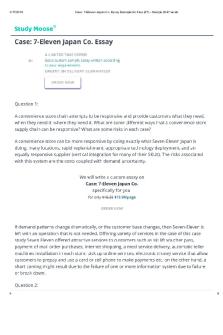Case 1 - seven -eleven case answers PDF

| Title | Case 1 - seven -eleven case answers |
|---|---|
| Author | Michelle Lu |
| Course | Supply Chain Mgmt |
| Institution | Wilfrid Laurier University |
| Pages | 2 |
| File Size | 42.2 KB |
| File Type | |
| Total Downloads | 39 |
| Total Views | 150 |
Summary
case 1
seven - eleven case analysis solutions...
Description
Michelle Lu 7-Eleven Case Q.1
In the case of 7-eleven, stores maintain responsiveness through having an extensive inventory tracking system. Data obtained from information systems allow individual locations to adjust merchandise through out the day in order to meet demand. For example, popular breakfast and dinner items are only stocked during appropriate hours. A risk to this highly responsive approach is its effect on supply chain efficiency. Given that 7-eleven stores (in Japan) must frequently replenish and replace its products, delivery trucks must be scheduled 3 times a day and thus increases their facility and transportation costs. Another way 7-eleven can be responsive through their information system is the use of their graphic order terminal. The device can provide data on sales, trends, and margins of a specific product. A store manager can respond to customer needs through analyzing the data and reordering popular items. This responsive tactic also can decrease efficiency as store managers must allocate more time to replenish goods which increases the costs of replenishment. Q.2
- 7-eleven frequently orders and delivers a wide range of products from an array of distributors and to many store locations. They must manage and monitor their supply chain closely to avoid disruptions. A risk that a rapid replenishment tactic must mitigate is the high cost of replenishment and transportation. -
Relying on information systems to manage the supply chain and replenish
products can be a huge risk due to system failure . 7-eleven information systems link individual stores to its suppliers, distribution networks and headquarters. If a service outage were to occur, it would lead to costly disruptions in the supply chain.
Q.7
Pros -
7-eleven does not need to invest in transportation or inventory facilities because distributors handle that portion of the supply chain. o As 7-eleven has a lower density of franchises in the United Sates, this may be favourable because it may cost more to build and maintain these facilities then to outsource
Cons -
Lack of control o Control of quality: 7-eleven distribution centers can not inspect products if food distribution services are outsourced. o Control on time: Rapid – replacement tactic may not be as effective. Food distribution services will have other customers to satisfy too. 7 – eleven must main good communication and relationships with distributors to avoid stock-outs....
Similar Free PDFs

7 Eleven Case Study
- 2 Pages

7-Eleven Case Study ASSIGNMENT 1
- 11 Pages

Case 7 Eleven Japan Co
- 8 Pages

Answers to Case Study 1
- 3 Pages

Case 1 - Case 1.1
- 2 Pages

Case 1 - Case 1 instructions
- 12 Pages

4 case studies answers
- 6 Pages

Nespresso case - answers
- 3 Pages

Answers to Case Studies
- 28 Pages
Popular Institutions
- Tinajero National High School - Annex
- Politeknik Caltex Riau
- Yokohama City University
- SGT University
- University of Al-Qadisiyah
- Divine Word College of Vigan
- Techniek College Rotterdam
- Universidade de Santiago
- Universiti Teknologi MARA Cawangan Johor Kampus Pasir Gudang
- Poltekkes Kemenkes Yogyakarta
- Baguio City National High School
- Colegio san marcos
- preparatoria uno
- Centro de Bachillerato Tecnológico Industrial y de Servicios No. 107
- Dalian Maritime University
- Quang Trung Secondary School
- Colegio Tecnológico en Informática
- Corporación Regional de Educación Superior
- Grupo CEDVA
- Dar Al Uloom University
- Centro de Estudios Preuniversitarios de la Universidad Nacional de Ingeniería
- 上智大学
- Aakash International School, Nuna Majara
- San Felipe Neri Catholic School
- Kang Chiao International School - New Taipei City
- Misamis Occidental National High School
- Institución Educativa Escuela Normal Juan Ladrilleros
- Kolehiyo ng Pantukan
- Batanes State College
- Instituto Continental
- Sekolah Menengah Kejuruan Kesehatan Kaltara (Tarakan)
- Colegio de La Inmaculada Concepcion - Cebu






